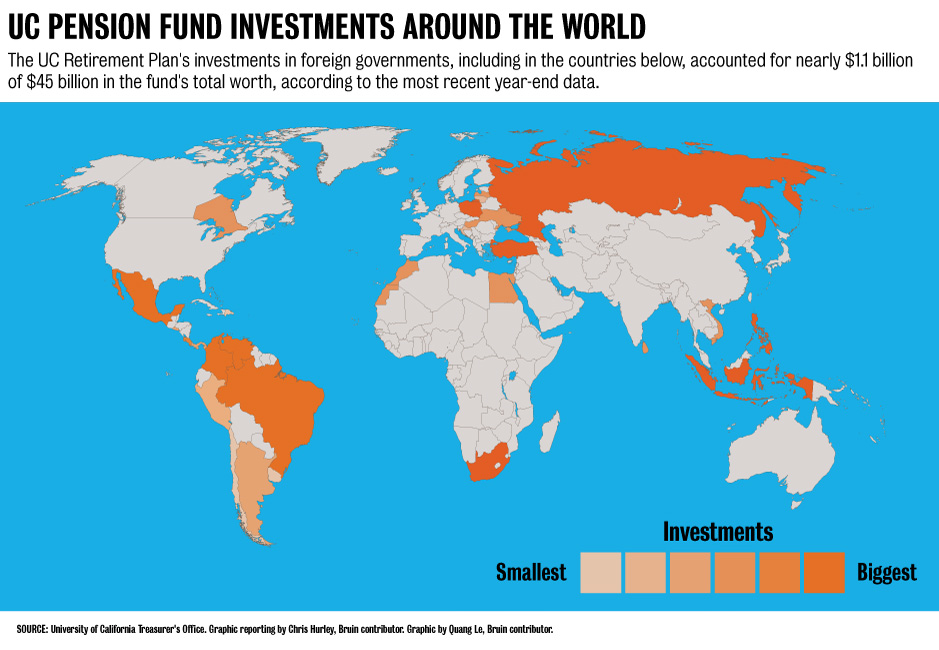UC reassesses investment decisions for retirement plans

By Christopher Hurley
April 14, 2014 2:27 a.m.
The holdings of the University of California Retirement Plan span the global economy, including Indonesian government bonds, stakes in the Kazakhstani state oil and gas firm and holdings with the American mortgage giant Fannie Mae.
But political turmoil abroad or other major global events can disrupt the typical investment policy of the UCRP, a $45 billion pension fund for UC employees that promises them a certain percentage of their income in retirement.
Theinvestmentportfolio is constantly under scrutiny by the UC Board of Regents, the governing board of the University, including its relation to the future benefit of pension fund members, said University spokeswoman Dianne Klein.
While changing its bond holdings because of current events is rare for the University, it is not unprecedented.
The regents vote on any changes in investment policy recommended by the chief investment officer or Committee on Investments, Klein said. The new UC chief investment officer, Jagdeep Singh Bachher, assumed office last week.
For instance, in the aftermath of the Sandy Hook shooting, the UC quickly got rid of its relatively small holdings in Cerberus, a fund that maintains strong interests in firearm companies, because some of the companies were the manufacturers of the weapons used in the attack.
The investments currently at the front of many UC officials’ minds are with Russian state oil company Gazprom and bonds bought from both Ukrainian and Russian governments.
Worth about $7 million, the Gazprom holdings are small fraction of the UCRP’s multibillion-dollar total.
Russian and Ukrainian bonds together are worth about $71 million, and represent a large share of the foreign bonds held by UCRP.
Given the current political crisis in the region, the UC is reviewing the holdings, Klein said.
Some global investors have speculated that the current crisis in Ukraine could provoke a partial default on the part of the Ukrainian government, which would damage any holder’s financial standing – including the UC.
Klein said she cannot comment on specific investment decision-making, but that the office of the chief investment officer is always monitoring the status of UC investments in the UCRP or general endowment, and makes decisions accordingly.
While social considerations are made in regards to investment decisions, they usually are not the primary focus – investment returns are, Klein said.
The only social barriers in the UCRP investment guidelines are the prohibition on investment in tobacco firms and in certain companies involved with operations in Darfur, Sudan, which had been the center of large-scale genocide. Other ethical decisions are made on a case-by-case basis.
The prohibition on investment in tobacco firms went in effect 2001 and has cost the UC around $471 million in lost gains since its implementation, according to the UC’s annual report on divestment.
“Sometimes the UC is willing to give up on some return in order to advance a particular cause,” Klein said.
While the fund’s participants and beneficiaries are solely employees, students do have a voice in crafting investment policy, Klein said.
In recent years, student-led divestment campaigns have rapidly spread across university campuses nationwide.
At the UC, student campaigns such as Fossil Free UC and IGNITE encourage the University to divest from companies that produce massive amounts of carbon leading to climate change and private prison companies, respectively.
In late February, the Undergraduate Students Association Council voted down a controversial resolution urging the UC to divest from companies such as Caterpillar, Cement Road Holdings, General Electric, Hewlett-Packard and Cemex, whose products have been used by the Israeli government and military in the ongoing occupation of the West Bank.
The Fossil Free UC campaign pushes specifically for divestment from the top 200 fossil fuel companies with the highest levels of carbon output, said Kareem Aref, president of the UC Student Association, which represents student interests from across the UC and supports Fossil Free UC.
Aref said the UC’s decision to invest in or divest from such companies carries weight to “change the conversation” on such a pressing cause, because it is a large and respected institution.
There has been progress on the campaign, with a regents-appointed task force looking into divestment scenarios, Aref said.
The issue has many more shades of gray, however, because many carbon-heavy companies are also leading investors in green technology, Klein said.
While not endorsing fossil fuel divestment, UC President Janet Napolitano announced her support in February of an initiative to make the UC carbon-neutral by 2025.
Social considerations at the cost of financial returns are far more difficult to consider as long as the UC faces a huge liability between its long-term obligations to provide pensions to their retirees and its long term ability to meet them.
The gap between the long-term funded portion of the pension and its promised payouts has provoked the regents to enact a range of contractual reforms involving increased contributions by both the workers and the UC.
Among the biggest investments the UC hopes can help generate returns include those in foreign governments.
Brazil, Mexico and Russia constitute the largest foreign government holdings through the UCRP, with around 25 other countries such as Hungary, El Salvador, Uruguay and Egypt also on the list.
The UCRP likely tries to match its bond holdings to an established fund’s holdings, which is why it tends to have geographically diverse holdings, said James Ryans, a doctoral candidate at the UC Berkeley Haas School of Business.
Aside from investments in foreign governments, the UC pension fund also contains holdings in foreign-based companies.
The UCRP’s investment in KazMunaiGaz, which is Kazakhstan’s state oil and gas firm, totals more than $22 million as of the most recent available data, and its holdings of Indonesian government bonds are worth around $35 million.
Amid pushes to divest from students and possible changes based on current events in Ukraine and Russia, all the UC can do is continue to review its investment decisions, Klein said.

